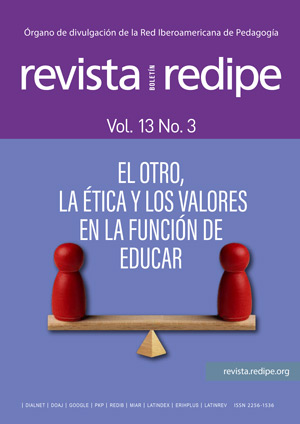La formación de valores éticos y morales en estudiantes universitarios: Una perspectiva comprensiva y edificadora
##plugins.themes.bootstrap3.article.main##
Keywords
Valores éticos, Educación universitaria, Formación integral, Pensamiento crítico ético, Ética digital, Mentoría ética
Resumen
Este estudio abordó la relevancia de los valores éticos y morales en la formación de estudiantes universitarios, explorando su magnificación en el contexto académico. Se investigaron métodos teóricos y estrategias para implementar una educación ética y edificante. La investigación se llevó a cabo en el entorno de la educación universitaria, considerando la constante evolución socioeconómica y cultural. El enfoque metodológico se basó en una perspectiva cualitativa y hermenéutica, permitiendo una comprensión profunda de la educación en valores. Los resultados revelaron que la educación en valores es esencial para preparar a los estudiantes para los desafíos éticos y morales de un mundo en transformación. La estrategia propuesta integra valores en el contexto disciplinario, fomenta el pensamiento crítico ético, aborda la ética digital y la responsabilidad tecnológica, y promueve la mentoría ética. Además, la evaluación de valores se enfoca en la aplicación práctica. Esta estrategia se alinea con la formación de ciudadanos éticos y responsables, capaces de contribuir positivamente a la sociedad y enfrentar los retos contemporáneos.
Referencias
Bain, K. (2007). Lo que hacen los mejores profesores universitarios. Universidad de Valencia.
Bolívar, A., Domingo, J., & Fernández, M. (2001). La investigación biográfico-narrativa en educación. Enfoque y metodología. La Muralla.
Brockbank, A., & McGill, I. (2002). Aprendizaje reflexivo en la educación superior. Morata.
Cullen, C. (1996). Autonomía moral, participación democrática y cuidado del otro. Novedades Educativas.
Day, C. (2006). Pasión por Enseñar. La identidad personal y profesional del docente y sus valores. Narcea.
Fenstermacher, G., & Soltis, J. (2007). Enfoques de la enseñanza. Amorrortu.
Fenstermacher, G. D., & Richardson, V. (2005). On making determinations of quality in teaching. Teachers College Record, 107(1), 188-213.
Freire, P. (1990). La naturaleza política de la educación. Cultura, poder y liberación. Paidós.
Gadamer, H. G. (2003). Verdad y Método. Volumen I. Sígueme.
Giroux, H. (2004). Teoría y Resistencia en Educación. Una pedagogía para la oposición. Siglo XXI.
Jackson, P. (2002). Práctica de la enseñanza. Amorrortu.
Litwin, E. (1997). Las configuraciones didácticas. Una nueva agenda para la enseñanza superior. Paidós.
Palmer, P. J. (2007). La sabiduría de enseñar. Una exploración de la relación entre la enseñanza y el aprendizaje. Narcea.
Rest, J. R. (1983). Morality. In P. H. Mussen (Ed.), Handbook of child psychology: Vol. 3. Socialization, personality, and social development (4th ed., pp. 556- 629). Wiley.
Ríos, M. (2003). Ética para universitarios. Ediciones Universidad de Navarra.
Sarasa, M. C., & Souto, M. (2008). La narrativa autobiográfica como dispositivo de formación. Revista de Educación, 345, 297-320.
Seligman, M. E. (2002). Authentic happiness: Using the new positive psychology to realize your potential for lasting fulfillment. Free Press.
Shor, I. (1992). Empowering education: Critical teaching for social change. University of Chicago Press.
Tom, A., & Sarasa, M. C. (2014). La narrativa autobiográfica como práctica reflexiva en la formación de docentes universitarios. Pedagogía Universitaria, 19(1), 129- 148.
Wigglesworth, C. (2016). Spiritual intelligence in leadership: From manager to leader in your own life. John Wiley & Sons.
Zeichner, K. M., & Liston, D. P. (1996). Reflective teaching: An introduction. Routledge.
Zohar, D., & Marshall, I. (2004). SQ: Spiritual intelligence, the ultimate intelligence. Bloomsbury Publishing.
Martínez, M. P., & Borrego, R. (2003). Hacia una formación universitaria en valores: Reflexiones y estrategias. Revista Iberoamericana de Educación, 32(3), 1-12.
Rokeach, M. (1973). The nature of human values. Free Press.



